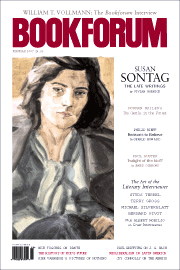
In Nuruddin Farah’s first novel, From a Crooked Rib, a young woman’s rebellion against traditional Somali society subtly mirrors the modern nation’s struggle for autonomy. That 1970 debut, written when Farah was a twenty-three-year-old philosophy student (and recently reissued by Penguin), exposed the brutalities of infibulation—a pre-Islamic custom—and forced marriage through the eyes of its nomadic heroine, Ebla, spurring recognition of its male author’s uncompromising feminism.
Forceful women characters, and an anatomy of family relationships from the viewpoint of those who have the least power within them, have continued to mark the novels of Farah, who won the Neustadt International Prize for Literature in 1998. In exile for twenty-two years under the 1969–91 dictatorship of General Mohamed Siad Barre and now living in Cape Town, he has always returned to Somalia as a setting, tracing links between moral dilemmas and coercion in the domestic sphere and power plays within the national and global arenas. He sees it as a duty, he once said, to keep his country alive by writing about it.
Farah’s tenth novel, Knots, is the second part of a trilogy set during the civil war sparked when Siad Barre was chased out of the capital, Mogadishu, in 1991, marking a descent from tyranny into anarchy. While the first installment, Links (2005), saw an exile’s homecoming to mourn his mother’s death, Knots follows the return to Mogadishu of an educated woman, Cambara, from Toronto, where she has lived most of her life as an actress and would-be playwright. Still recovering from the death of her nine-year-old son, who drowned in a pool while his feckless father was in bed with another woman, she aims to reclaim the family house from the minor warlord who has seized it.
More than ten years after the collapse of 1991, Cambara finds a city whose salty humidity triggers childhood memories but is otherwise unrecognizable in its ruination, with women in cheap chadors and men in sarongs and flip-flops, guns slung over their shoulders. In a city where everyone is flocking to the warlords’ homes, their heads bowed in fawning subservience, youths are armed to their khat-ruined teeth with weapons bequeathed by rival superpowers in the ’80s, when the Horn of Africa was a cold-war battleground. Veils, once alien to cosmopolitan Mogadishu, are urged, even forced, upon women.
The collapse is exemplified by Cambara’s cousin Zaak, an erstwhile wife-beater charged with conciliating clan-based militias—many of which have fallen out with former allies—but more intent on chewing khat leaves until his eyes redden and he wallows impassively in his own dirt and foul breath. In Cambara’s opinion, only a corrupt society tolerates living in such filth, and especially culpable are the men, who put up with the muck they have made. Farah’s men are generally losers. Even Bile, the depressive doctor with whom Cambara falls in love, must be rescued from lying in his own waste. As Cambara finds the veil both curse and camouflage, a knife hidden beneath her restrictive body tent, she takes action to transform her surroundings, seizing youths’ khat and informally adopting two wayward boys, clothing them in her dead son’s outfits and reuniting one with his mother. She finds allies in other women, such as the hotelier Kiin and the Women for Peace Network.
Although the symbolism of reclaiming Somalia from its militias and warlords may occasionally be overly signposted, the first half of the novel, in which the repellent Zaak spars with Cambara in a tangle of relationships as intricate as they are destructive, is the stronger. As Cambara becomes involved in putting on a play in a society starved of cultural expression, obstacles melt away in a plot that may owe more to the author’s will than to reality. Yet at its best, Knots is a powerful dissection of a fragmented society, in which, says Kiin, there are so many fault lines that no two Somalis think alike. Men, she adds, are prone to escalating minor differences until they become armed confrontations, every shoot-out boiling over into unstoppable battles, which explode into wars.
The novel exposes the conditions that allow a repressive Islamism to emerge. As one character remarks, though Islamic clerics have been discredited by inertia or kowtowing to warlords, the Islamists may end up gaining the upper hand by appealing to the Somali sense of national identity in place of the clan. The warlords are a spent force, the Islamists not yet. But the author underlines more humane versions of Islam. In a telling moment, a devout taxi driver, his lips still astir with his recital of Koranic verses, nods approvingly as Cambara frees herself of her veil.
Farah, whose experiments with writing in Somali—a written language only since 1972—were curtailed by censorship and exile, writes in English. He can alight on strikingly original metaphors. Though at times the effect can be strained (someone’s eyes are huge as stray UFOs spotted over a mountain at dawn), they are often arrestingly apt. A fevered woman’s tongue is out and motionless, like an alligator sunning, while a woman who has had an illegal abortion senses doctors reading her body the way a blind person reads Braille.
A writer has to be a dreamer for his people, Farah has said. Knots combines faith in a beleaguered people with grave analysis of an imploded society. As Somalia’s ascendant Islamists clash with neighboring Ethiopia, Farah’s latest novel offers a salutary reminder of the Islamists’ origins in civil strife.
Maya Jaggi is a journalist and critic who has profiled many international writers for The Guardian. She served as a judge of the 2006 Caine Prize for African Writing.
